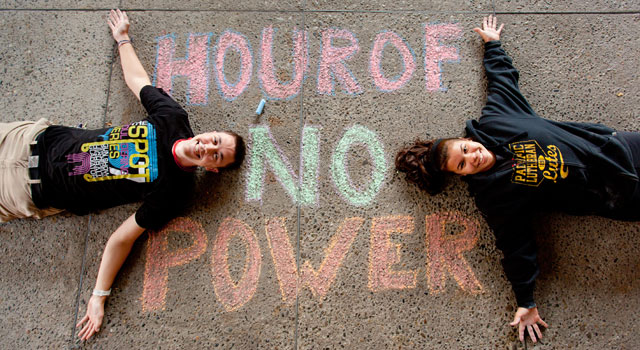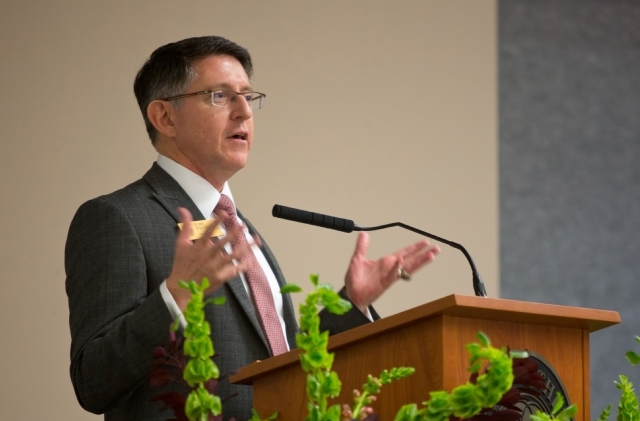Page 5 • (100 results in 0.057 seconds)
-
to serve the most vulnerable people of her community invites Lutes and friends of PLU to consider the university’s vocation to “care for other people and their communities” at a time of the year marked by conspicuous consumption. REGISTER HERE
-
Cosmopolitanism, Aesthetics, and Celine DionMy name is Dr. Michael Rings and I am very pleased and excited to be joining PLU’s Department of Philosophy as a Visiting Assistant Professor through Spring 2017. My research lies at the intersection of ethics and the philosophy of art and builds on my dissertation, “The Aesthetic Cosmopolitan Project,” which explores ethical and political issues that arise in contexts of cross-cultural art appreciation and consumption. This research interest informed
-

a competition between eight of the residence halls, but this year all halls are involved and organizers hope the energy savings will continue after the competition. The Sustainability Department is trying to make it more than a competition, so students will understand why being aware of individual power consumption is important, according to RHA Sustainability Director Anna Pfohl ‘12. “If they understand, they will continue with these habits,” she explained. Pfohl encourages students to “be
-

environment is “an important part of PLU’s DNA,” he added. This commitment to sustainability intertwines seamlessly with PLU’s commitment to social justice and diversity, he said. Several of the future goals for PLU include incorporating a carbon offset for air travel by 2014 and using more geothermal energy in the halls and buildings. During the ceremony, it was announced that Hinderlie Hall won this fall’s unPLUg challenge to reduce energy consumption by 16 percent, when compared with last year’s
-

mindset, that will propel our transition to new norms.” –Michelle Y. Long,’85 Chair, PLU Regents General Manager, Business Optimization, Chevron USA “Sustainability. How do we provide? Or how do we think about the world in a more sustainable way? We’re innovating around that. It’s not just a consumption of goods and services anymore, right? It is the reuse of goods, and the extension of services, to allow circularity in our products, in our economies, and in our lives.” -Tom Saathoff ’87 PLU Regent
-
“Sexual Harassment Policy”; recruitment, pledging, admission into, or affiliation with student organizations, which specifically includes athletic teams; and acts that are likely to cause harm to someone, including consumption of alcohol, drugs, or other substances that risk physical, psychological, or emotional harm, regardless of a person’s willingness to participate. Hazing also includes soliciting, directing, aiding, or otherwise participating actively or passively in such acts. Hazing occurs
-
topics or historical figures in the history of philosophy. May be repeated for credit once with a different topic. Prerequisite: sophomore standing. (4) PHIL 327 : Environmental Philosophy - VW Examines concepts such as wilderness, nature/natural, and consciousness. This examination leads to consideration of issues such as resource distribution and consumption, obligations to future generations and other than human life. Specifically the preservation of endangered species, animal experimentation
-
aware of the institutional arrangements that drive consumption and production choices both domestically and abroad and use your analytical skills to derive the implications of alternative policy choices. Working directly with a faculty member, you will conduct independent research and present your findings, developing both oral and written communications skills. Building on this foundation, previous economics students have pursued successful public and private sector careers in fields as diverse as
-
following policy has been established in recognition of, and coordination with, Washington State law and PLU’s university policy on Alcoholic Beverages. Possession of an open container of alcohol and/or consumption of alcohol in South Hall common areas (hallways, lounges, etc.) is prohibited. Alcoholic beverages are only permitted in South Hall common areas as they are being transported to an apartment where alcohol is permitted. Possession and/or consumption of alcohol in a unit is permitted if all
-

goal of the project is to develop an assessment model to evaluate Pacific Northwest residents’ adoption of smart home technology and its impact on energy consumption behaviors. Project participants hope to generate market research that can help utility providers better understand their customers, and assist consumers in choosing the most energy efficient systems for their homes. Two grants from the Puget Sound Energy Foundation, are making the PLU campus safer. They helped launch a new emergency
Do you have any feedback for us? If so, feel free to use our Feedback Form.


